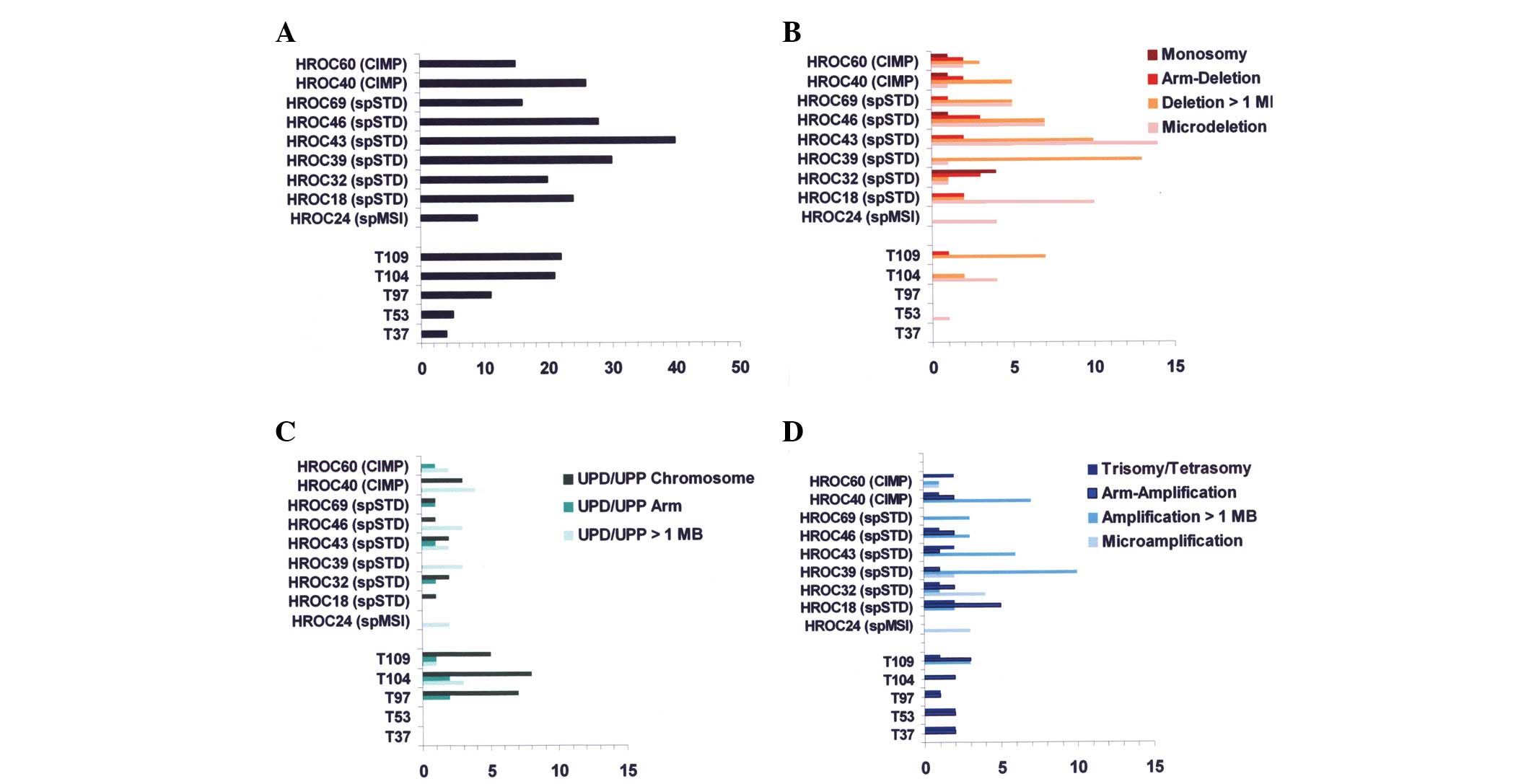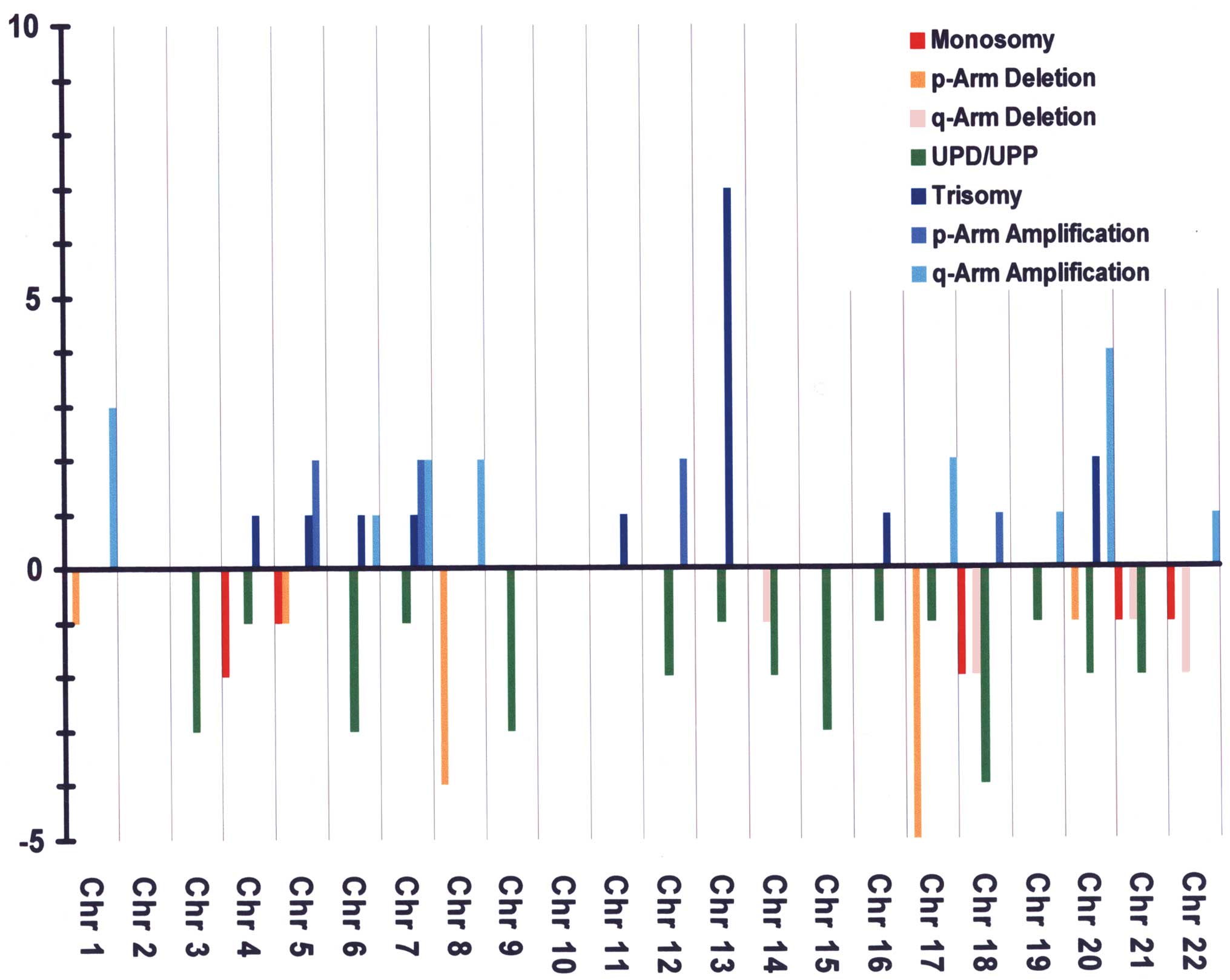|
1
|
Lengauer C, Kinzler KW and Vogelstein B:
Genetic instabilities in human cancers. Nature. 396:643–649. 1998.
View Article : Google Scholar : PubMed/NCBI
|
|
2
|
Toyota M, Ahuja N, Ohe-Toyota M, Herman
JG, Baylin SB and Issa JP: CpG island methylator phenotype in
colorectal cancer. Proc Natl Acad Sci USA. 96:8681–8686. 1999.
View Article : Google Scholar : PubMed/NCBI
|
|
3
|
Boland CR, Thibodeau SN, Hamilton SR,
Sidransky D, Eshleman JR, Burt RW, Meltzer SJ, Rodriguez-Bigas MA,
Fodde R, Ranzani GN and Srivastava S: A National Cancer Institute
workshop on microsatellite instability for cancer detection and
familial predisposition: development of international criteria for
the determination of microsatellite instability in colorectal
cancer. Cancer Res. 58:5248–5257. 1998.
|
|
4
|
Ogino S, Cantor M, Kawasaki T, Brahmandam
M, Kirkner GJ, Weisenberger DJ, Campan M, Laird PW, Loda M and
Fuchs CS: CpG island methylator phenotype (CIMP) of colorectal
cancer is best characterised by quantitative DNA methylation
analysis and prospective cohort studies. Gut. 55:1000–1006. 2006.
View Article : Google Scholar : PubMed/NCBI
|
|
5
|
Jass JR: Classification of colorectal
cancer based on correlation of clinical, morphological and
molecular features. Histopathology. 50:113–130. 2007. View Article : Google Scholar : PubMed/NCBI
|
|
6
|
Ostwald C, Linnebacher M, Weirich V and
Prall F: Chromosomally and microsatellite stable colorectal
carcinomas without the CpG island methylator phenotype in a
molecular classification. Int J Oncol. 35:321–327. 2009.PubMed/NCBI
|
|
7
|
Gaasenbeek M, Howarth K, Rowan AJ, Gorman
PA, Jones A, Chaplin T, Liu Y, Bicknell D, Davison EJ, Fiegler H,
Carter NP, et al: Combined array-comparative genomic hybridization
and single-nucleotide polymorphism-loss of heterozygosity analysis
reveals complex changes and multiple forms of chromosomal
instability in colorectal cancers. Cancer Res. 66:3471–3479. 2006.
View Article : Google Scholar
|
|
8
|
Andersen CL, Wiuf C, Kruhøffer M,
Korsgaard M, Laurberg S and Ørntoft TF: Frequent occurrence of
uniparental disomy in colorectal cancer. Carcinogenesis. 28:38–48.
2007. View Article : Google Scholar : PubMed/NCBI
|
|
9
|
Linnebacher M, Maletzki C, Ostwald C,
Klier U, Krohn M, Klar E and Prall F: Cryopreservation of human
colorectal carcinomas prior to xenografting. BMC Cancer.
10:362–371. 2010. View Article : Google Scholar : PubMed/NCBI
|
|
10
|
Prall F, Weirich V and Ostwald C:
Phenotypes of invasion in sporadic colorectal carcinomas related to
aberrations of the adenomatous polyposis coli (APC) gene.
Histopathology. 50:318–330. 2007. View Article : Google Scholar : PubMed/NCBI
|
|
11
|
Tomlison IPM, Lambros MBK and Roylance RR:
Loss of heterozygosity analysis: Practically and conceptually
flawed? Genes Chromosomes Cancer. 34:349–353. 2002. View Article : Google Scholar : PubMed/NCBI
|
|
12
|
Devilee P, Cleton-Jansen AM and Cornelisse
CJ: Ever since Knudson. Trends in Genet. 17:569–573. 2001.
View Article : Google Scholar : PubMed/NCBI
|
|
13
|
Wood LD, Parsons DW, Jones S, Lin J,
Sjöblom T, Leary RJ, Shen D, Boca SM, Barber T, Ptak J, Silliman N,
et al: The genomic landscapes of human colorectal breast and
colorectal cancers. Science. 318:1108–1113. 2007. View Article : Google Scholar : PubMed/NCBI
|
|
14
|
Andersen CL, Lamy P, Thorsen K, Kjeldsen
E, Wikman F, Villesen P, Oster B, Laurberg S and Orntoft TF:
Frequent genomic loss at chr16p13.2 is associated with poor
prognosis in colorectal cancer. Int J Cancer. 129:1848–1858. 2011.
View Article : Google Scholar : PubMed/NCBI
|
|
15
|
Wierzbicki PM, Adrych K, Kartanowicz D,
Dobrowolski S, Stanislawowski M, Chybicki J, Godlewski J,
Korybalski B, Smoczynski M and Kmiec Z: Fragile histidine triad
(FHIT) gene is overexpressed in colorectal cancer. J Physiol
Pharmacol. S4:63–70. 2009.PubMed/NCBI
|
|
16
|
Bradley WE, Raelson JV, Dubois DY, Godin
E, Fournier H, Privé C, Allard R, Pinchuk V, Lapalme M, Paulussen
RJ and Belouchi A: Hotspots of large rare deletions in the human
genome. PloS One. 5:e94012010. View Article : Google Scholar : PubMed/NCBI
|
|
17
|
Mitelman F, Johansson B and Mertens F: The
impact of translocations and gene fusions on cancer causation.
Nature Rev Cancer. 7:233–245. 2007. View
Article : Google Scholar : PubMed/NCBI
|
|
18
|
Bass AJ, Lawrence MS, Brace LE, Ramos AH,
Drier Y, Cibulskis K, Sougnez C, Voet D, Saksena G, Sivachenko A,
Jing R, et al: Genomic sequencing of colorectal adenocarcinomas
identifies a recurrent VTI1A-TCF7L2 fusion. Nature Genetics.
43:964–968. 2011. View
Article : Google Scholar : PubMed/NCBI
|
















